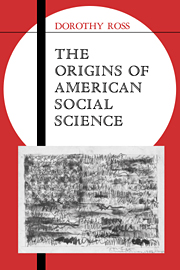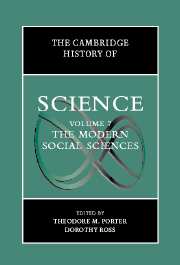The Origins of American Social Science
Focusing on the disciplines of economics, sociology, political science, and history, this book examines how American social science came to model itself on natural science and liberal politics. Professor Ross argues that American social science receives its distinctive stamp from the ideology of American exceptionalism, the idea that America occupies an exceptional place in history, based on her republican government and wide economic opportunity. Professor Ross shows how each of the social science disciplines, while developing their inherited intellectual traditions, responded to change in historical consciousness, political needs, professional structures, and the conceptions of science available to them. This is a comprehensive book, which looks broadly at American social science in its historical context and to demonstrate the central importance of the national ideology of American exceptionalism to the development of the social sciences and to American social thought generally.
Product details
July 1992Paperback
9780521428361
536 pages
230 × 150 × 30 mm
0.835kg
Available
Table of Contents
- Introduction
- Part I. European Social Science in Antebellum America:
- 1. The discovery of modernity
- 2. The American exceptionalist vision
- Part II. The Crisis of American Exceptionalism, 1865–1896:
- 3. Establishment of the social science disciplines
- 4. The threat of socialism in economics and sociology
- Part III. Progressive Social Science, 1896–1914:
- 5. The liberal revision of American exceptionalism
- 6. Marginalism and historicism in economics
- 7. Toward a sociology of social control
- 8. From historico-politics to political science
- Part IV. American Social Science As The Study Of Natural Process, 1908–1929:
- 9. Modernist historical consciousness and American liberal change
- 10. The advent of scientism
- Epilogue
- Footnote abbreviations
- Footnotes.




